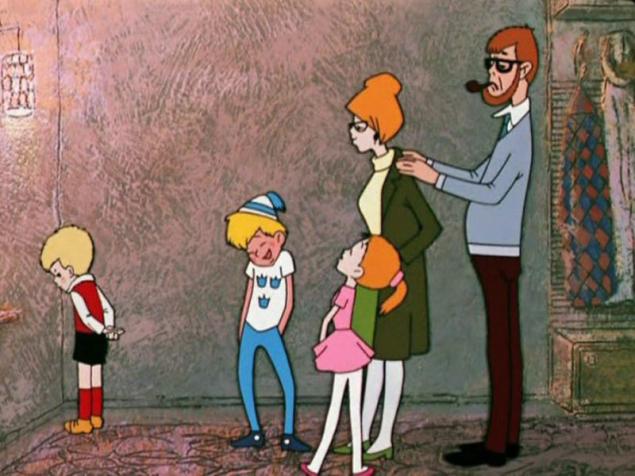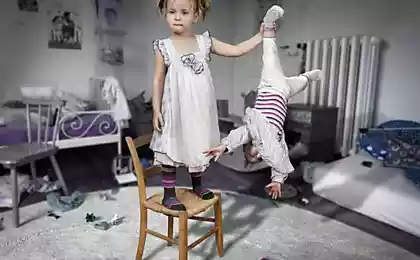546
To teach a child to lie, it should be punished
At all times children are punished for the misdeeds: they had to put knees on peas, then beat with a belt and closed in the room. Now often select a computer or tablet. But is it possible to achieve the desired prohibitions or punishments and not to spoil relations with a child?
Punishment as a practice of educating children (and adults) exists for thousands of years. What punishment mankind has not invented over the years: fine fixtures designed ingeniously to bring the guilty scattered across all the historical museums of Europe. Punishment has evolved in a liberal direction — from the lions and the amputation of the arms to the links to Siberia and arrests. Baby punishment also undergone its own path of development: from a slap to a spanking, standing on the peas in the corner to service the whole week to wash the floors in the house; from the deprivation of sweet at lunch to the deprivation of computer or tablet.

The world of punishments varied. Means much effort is involved an incredible amount, but good bit.
Wars, not fewer. The crime rate is the highest in countries where most prisons, particularly in Russia and the United States. Adults without fear of punishment or getting used to it, continue to break the law. Not so much in the world parents, who could boast of efficiency of punishment of their children. And only heard: "So I told him and the telly was forbidden to watch, and the computer selected, and it is still lessons not doing."
Hence the conclusion — the punishment of not performing an educational function.
Through punishment (e.g. prison) can for some time be isolated from society, who have caused this harm to society. In this case, nobody is fooled: judges, attorneys, and law enforcement officers know that in nine cases out of ten, after spending his own, the offender will go back to the old one.
But some parents still believe that using punishment can be something to fix, vaccinate, something to protect or to warn, to teach something. It is impossible, not even hope.
Usually after that concerned parents sarcastically asking, "Well, you're all psychologists humanists. And what are we to do? After all, he (she) really got out of hand, rude, not doing lessons and walk late. How can we be, if not to punish?"
And I'm always in such moments I want to reply to ask how they manage to do things at work and with each other, without the aid of rifles and massacre? After all, most normal people it possible, somehow, right? And even if sometimes I want to punch somebody in the face, we refrain, because we are bound by social norms and rules.
That punishment of children and teenagers exactly such a case: if you decide that for you it is unacceptable and impossible that themselves include other mechanisms. Rather, your brain will have to look for these new mechanisms and methods. And you will find, to be sure.
Before you begin to actively dissuade you punish children, will say a few words about "natural consequences of punishment". And, perhaps, is that for adolescents it is working. Did not come in time for dinner — cook your own food. Rude someone be so kind to apologize and to listen to what the person you have offended, think about it. Promised to do something around the house and did figure out how to pay for unfulfilled promises.
But the main thing is not to confuse. Deprivation computer for a week because bad son wrote the pilot, is not "punishment natural consequences." As the refusal to buy the phone as a punishment for something that was caught in the yard Smoking a cigarette.
What else should I say about the punishment consequences? Do not expect that enough times. The experience of Teens is formed not as fast as we would like. This is the feature of childhood and adolescence. Often Teens have a lot of time to run into the results of their actions to extract useful experience.
Now a little bit about what we actually bring up when they think that raising penalties.
1. The position of the person who punishes in the position of power, dangerous and harmful to any relationship, and especially for relationships among relatives. This position has on any person destroying, corrupting effect. If I'm holding absolute power over the life of another person, I risk losing control of your emotions, lose the ability to distinguish their hostile impulses from a sense of justice. Except in kindergartens, orphanages, shelters for the elderly has completely sadistic? Not at all. But the situation has complete power over the lives of helpless, dependent children, or the elderly leads to the fact that the ordinary people show themselves as cruel and callous. Parents — ordinary people, they are not immune to revel in their power and impunity.
2. The main skill, honed by child, teenager and even adults who educate or correct through punishment, is the ability to deceive, to hide their intentions to cheat. Because any of us seek to avoid the unpleasant, hurtful, painful. Want to teach your teen to lie, cease to trust him and lose his trust? Punishment is just a good way to achieve this. With age, the sensitivity to punishment reduced.
3. Few of the children are met by the punishment, so to speak, "with open visor", meekly accept everything the Lord sends. It's for the best, because in such obedience is not good. People obviously are willing to tolerate actions that violate its psychological (or physical) integrity. People accustomed to think that violence is the norm. And is vulnerable to any who would declare himself "king of the hill". Punish and expect obedience from the child? Don't be surprised then if he gets under bad influence. It is easy to bend, easy to intimidate. Also don't be surprised if a teenager suddenly discover the traits of the oppressor and tormentor of the weak. The rage and anger that he saves, taking your punishment should be. And options for this a bit: to take revenge on others and to torture them or to hurt and suffer the most. Aggression, which has no outlet, turns into aggression.
continue reading mel.fm
Author: Vita Malygina
P. S. And remember, just changing your mind — together we change the world! ©
Join us in Facebook , Vkontakte, Odnoklassniki
Source: mel.fm/2015/12/25/punishment
Punishment as a practice of educating children (and adults) exists for thousands of years. What punishment mankind has not invented over the years: fine fixtures designed ingeniously to bring the guilty scattered across all the historical museums of Europe. Punishment has evolved in a liberal direction — from the lions and the amputation of the arms to the links to Siberia and arrests. Baby punishment also undergone its own path of development: from a slap to a spanking, standing on the peas in the corner to service the whole week to wash the floors in the house; from the deprivation of sweet at lunch to the deprivation of computer or tablet.

The world of punishments varied. Means much effort is involved an incredible amount, but good bit.
Wars, not fewer. The crime rate is the highest in countries where most prisons, particularly in Russia and the United States. Adults without fear of punishment or getting used to it, continue to break the law. Not so much in the world parents, who could boast of efficiency of punishment of their children. And only heard: "So I told him and the telly was forbidden to watch, and the computer selected, and it is still lessons not doing."
Hence the conclusion — the punishment of not performing an educational function.
Through punishment (e.g. prison) can for some time be isolated from society, who have caused this harm to society. In this case, nobody is fooled: judges, attorneys, and law enforcement officers know that in nine cases out of ten, after spending his own, the offender will go back to the old one.
But some parents still believe that using punishment can be something to fix, vaccinate, something to protect or to warn, to teach something. It is impossible, not even hope.
Usually after that concerned parents sarcastically asking, "Well, you're all psychologists humanists. And what are we to do? After all, he (she) really got out of hand, rude, not doing lessons and walk late. How can we be, if not to punish?"
And I'm always in such moments I want to reply to ask how they manage to do things at work and with each other, without the aid of rifles and massacre? After all, most normal people it possible, somehow, right? And even if sometimes I want to punch somebody in the face, we refrain, because we are bound by social norms and rules.
That punishment of children and teenagers exactly such a case: if you decide that for you it is unacceptable and impossible that themselves include other mechanisms. Rather, your brain will have to look for these new mechanisms and methods. And you will find, to be sure.
Before you begin to actively dissuade you punish children, will say a few words about "natural consequences of punishment". And, perhaps, is that for adolescents it is working. Did not come in time for dinner — cook your own food. Rude someone be so kind to apologize and to listen to what the person you have offended, think about it. Promised to do something around the house and did figure out how to pay for unfulfilled promises.
But the main thing is not to confuse. Deprivation computer for a week because bad son wrote the pilot, is not "punishment natural consequences." As the refusal to buy the phone as a punishment for something that was caught in the yard Smoking a cigarette.
What else should I say about the punishment consequences? Do not expect that enough times. The experience of Teens is formed not as fast as we would like. This is the feature of childhood and adolescence. Often Teens have a lot of time to run into the results of their actions to extract useful experience.
Now a little bit about what we actually bring up when they think that raising penalties.
1. The position of the person who punishes in the position of power, dangerous and harmful to any relationship, and especially for relationships among relatives. This position has on any person destroying, corrupting effect. If I'm holding absolute power over the life of another person, I risk losing control of your emotions, lose the ability to distinguish their hostile impulses from a sense of justice. Except in kindergartens, orphanages, shelters for the elderly has completely sadistic? Not at all. But the situation has complete power over the lives of helpless, dependent children, or the elderly leads to the fact that the ordinary people show themselves as cruel and callous. Parents — ordinary people, they are not immune to revel in their power and impunity.
2. The main skill, honed by child, teenager and even adults who educate or correct through punishment, is the ability to deceive, to hide their intentions to cheat. Because any of us seek to avoid the unpleasant, hurtful, painful. Want to teach your teen to lie, cease to trust him and lose his trust? Punishment is just a good way to achieve this. With age, the sensitivity to punishment reduced.
3. Few of the children are met by the punishment, so to speak, "with open visor", meekly accept everything the Lord sends. It's for the best, because in such obedience is not good. People obviously are willing to tolerate actions that violate its psychological (or physical) integrity. People accustomed to think that violence is the norm. And is vulnerable to any who would declare himself "king of the hill". Punish and expect obedience from the child? Don't be surprised then if he gets under bad influence. It is easy to bend, easy to intimidate. Also don't be surprised if a teenager suddenly discover the traits of the oppressor and tormentor of the weak. The rage and anger that he saves, taking your punishment should be. And options for this a bit: to take revenge on others and to torture them or to hurt and suffer the most. Aggression, which has no outlet, turns into aggression.
continue reading mel.fm
Author: Vita Malygina
P. S. And remember, just changing your mind — together we change the world! ©
Join us in Facebook , Vkontakte, Odnoklassniki
Source: mel.fm/2015/12/25/punishment
The simplest recipe will reduce the pressure for many years!
The amazing healing properties of chlorophyll are: cures ALL diseases!
























